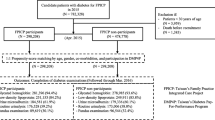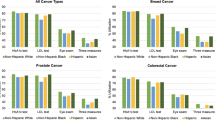Abstract
Purpose
This study aimed to examine the impact of utilization of the Medicare-covered Diabetes Self-Management Training (DSMT) on the likelihood of receiving preventive care and on outcomes among cancer survivors with diabetes.
Methods
We conducted a retrospective cohort study using 1999–2019 Texas Cancer Registry-Medicare linkage data for beneficiaries diagnosed with prostate, colorectal, or breast cancer for ≥5 years. We used propensity score matching to estimate the beneficiaries’ probability of receiving DSMT and matched it with non-users. The observed DSMT outcomes were hospitalization, ER visit, eye exam, HbA1c test, foot exam, nephropathy, and all-cause mortality. DSMT utilization was set at attending 1, 2, and 3 or more sessions. Conditional Cox proportional hazard regression was built to determine the association between DSMT use and each respective outcome, unadjusted and adjusted for patients’ covariates.
Results
A total of 79,271 beneficiaries (65% had diabetes-related complications, and 41% were either prostate or breast cancer survivors) were included. We found that (1) DSMT users had more eye exams (HR=1.27), HbA1c tests (HR=1.47), foot exams (HR=1.21), and nephropathy visits (HR=1.11), and less hospitalization (HR=0.86) and overall mortality (HR=0.70) (p≤0.01 each vs. non-users); (2) among DSMT users, 56% attended one session, 24% attended 2 sessions, and 20% attended 3 or more sessions; (3) attending 2 or ≥3 DSMT sessions was associated with more eye exams (HR=1.14), HbA1c tests (HR=1.12), and foot exams (HR=1.24).
Conclusions
DSMT is instrumental to preventing or delaying complications of diabetes in cancer survivors and reducing their overall mortality. The findings may inform future efforts to promote the value of DSMT for cancer survivors.
Implications for Cancer Survivors
Medicare-covered DSMT offers a great value to cancer survivors with diabetes.


Similar content being viewed by others

Data availability
The research was focused on secondary data analysis of 100% Texas Medicare claims with information on patients’ demographics, diagnosis, prescription, procedure, physician’s characteristics, and facility type. The existing data is available from National Cancer Institute (NCI) under the specific data user agreement (DUA). We are not permitted to share these data due to the risk of potential identification of individual patients. To acquire the same type of data, investigators need to submit an application to the NCI.
References
Centers for Disease Prevention and Control. Promoting health for older adults. 2022a. https://www.cdc.gov/chronicdisease/resources/publications/factsheets/promoting-health-for-older-adults.htm#:~:text=Aging%20increases%20the%20risk%20of,death%2C%20and%20health%20care%20costs. Accessed 2 May 2023.
USAHealthRankings. US Leading Causes. 2023. https://www.worldlifeexpectancy.com/usa-health-rankings. Accessed 2 May 2023.
Centers for Disease Prevention and Control (CDC). Health and economic benefits of diabetes interventions. 2022b. https://www.cdc.gov/chronicdisease/programs-impact/pop/diabetes.htm. Accessed 2 May 2023.
American Diabetes Association (ADA). Economic costs of diabetes in the US in 2017. Diabetes Care. 2018;41(5):917–928
Avalere Health. Comparing detection, treatment, outcomes, and spending for patients with type 2 diabetes between Medicare Advantage and Fee-For-Service Medicare. 2023. https://bettermedicarealliance.org/wp-content/uploads/2023/01/Avalere-Diabetes-Progression-Whitepaper_1.10.23.pdf. Accessed 2 May 2023.
Chen CT, Li L, Brooks G, Hassett M, Schrag D. Medicare spending for breast, prostate, lung, and colorectal cancer patients in the year of diagnosis and year of death. Health Serv Res. 2018;53(4):2118–32. https://doi.org/10.1111/1475-6773.12745.
McDaniel CC, Loh FE, Rockwell DM, McDonald CP, Chou C. Economic burden of diabetes among Medicare beneficiaries with cancer. J Pharm Health Serv Res. 2021;12(2):142–51. https://doi.org/10.1093/jphsr/rmab002.
Tao H, O’Neil A, Choi Y, Wang W, Wang J, Wang Y, Jia Y, Chen X. Pre- and post-diagnosis diabetes as a risk factor for all-cause and cancer-specific mortality in breast, prostate, and colorectal cancer survivors: a prospective cohort study. Front Endocrinol. 2020;18(11):60. https://doi.org/10.3389/fendo.2020.00060.
Centers for Medicare and Medicaid Services (CMS). Medicare diabetes prevention & diabetes self-management training. 2021. https://www.cms.gov/Outreach-and-Education/Medicare-Learning-Network-MLN/MLNProducts/Downloads/DSMT-Fact-Sheet-909381Print-Friendly.pdf. Accessed 2 May 2023.
Wilson-Anumudu F, Quan R, Castro Sweet C, Cerrada C, Juusola J, Turken M, Bradner JC. Early insights from a digitally enhanced diabetes self-management education and support program: single-arm nonrandomized trial. JMIR Diabetes. 2021;6(1):e25295.
Gary TL, Batts-Turner M, Yeh HC, Hill-Briggs F, Bone LR, Wang NY, Levine DM, Powe NR, Saudek CD, Hill MN, McGuire M, Brancati FL. The effects of a nurse case manager and a community health worker team on diabetic control, emergency department visits, and hospitalizations among urban African Americans with type 2 diabetes mellitus: a randomized controlled trial. Arch Intern Med. 2009;169(19):1788–94. https://doi.org/10.1001/archinternmed.2009.338.
Gumbs JM. Relationship between diabetes self-management education and self-care behaviors among African American women with type 2 diabetes. J Cult Divers. 2012;19(1):18–22.
Johnson TM, Richards J, Churilla JR. Care utilization patterns and diabetes self-management education duration. Diabetes Spectr. 2015;28(3):193–200. https://doi.org/10.2337/diaspect.28.3.193.
Nekhlyudov L, O’malley DM, Hudson SV. Integrating primary care providers in the care of cancer survivors: gaps in evidence and future opportunities. Lancet Oncol. 2017;18(1):e30–8.
World Health Organization. Cancer. 2022. https://www.who.int/news-room/fact-sheets/detail/cancer. Accessed 12 Oct 2023.
Stuart EA. Matching methods for causal inference: a review and a look forward. Stat Sci. 2010;25(1):1–21. https://doi.org/10.1214/09-STS313.
Weymann D, Laskin J, Jones SJM, Lim H, Renouf DJ, Roscoe R, Schrader KA, Sun S, Yip S, Marra MA, Regier DA. Matching methods in precision oncology: an introduction and illustrative example. Mol Genet Genomic Med. 2021;9(1):e1554. https://doi.org/10.1002/mgg3.1554.
Medicare Learning Network®. Diabetes Self-Management Training (DSMT) (NCD 40.1). 2023. https://www.cms.gov/Medicare/Prevention/PrevntionGenInfo/medicare-preventive-services/MPS-QuickReferenceChart-1.html#DIABETES_SELF. Accessed 2 May 2023.
Shah BR, Hux JE, Laupacis A, Zinman B, Cauch-Dudek K, Booth GL. Administrative data algorithms can describe ambulatory physician utilization. Health Serv Res. 2007;42:1783–96.
Strawbridge LM, Lloyd JT, Meadow A, Riley GF, Howell BL. One-year outcomes of diabetes self-management training among Medicare beneficiaries newly diagnosed with diabetes. Med Care. 2017;55(4):391–7. https://doi.org/10.1097/MLR.0000000000000653.
Centers for Disease Prevention and Control. Diabetes education linked to better diabetes self-care. 2022c. https://www.cdc.gov/diabetes/resources-publications/research-summaries/DSMES-research-summary.html. Accessed 2 May 2023.
Duncan I, Ahmed T, Li QE, Stetson B, Ruggiero L, Burton K, Rosenthal D, Fitzner K. Assessing the value of the diabetes educator. Diabetes Educ. 2011;37(5):638–57. https://doi.org/10.1177/0145721711416256.
Murphy L, Sherifali D, Ali MU, Ibrahim S. Influence of diabetes mellitus on oncological outcomes for patients living with cancer. Sci Diabetes Self Manag Care. 2023;49(2):163–79. https://doi.org/10.1177/26350106231153073.
Rise MB, Pellerud A, Rygg LØ, Steinsbekk A. Making and maintaining lifestyle changes after participating in group-based type 2 diabetes self-management educations: a qualitative study. PLoS ONE. 2013;8(5):e64009.
Essien UR, Tang Y, Figueroa JF, Litam TMA, Tang F, Jones PG, Patel R, Wadhera RK, Desai NR, Mehta SN, Kosiborod MN, Vaduganathan M. Diabetes care among older adults enrolled in Medicare Advantage versus traditional Medicare fee-for-service plans: the Diabetes Collaborative registry. Diabetes Care. 2022;45(7):1549–57. https://doi.org/10.2337/dc21-1178.
Centers for Disease Prevention and Control. Overcoming barriers to referral and treatment. 2021. https://www.cdc.gov/diabetes/dsmes-toolkit/referrals-participation/overcoming-barriers.html#:~:text=Individual%20barriers%20to%20access%20and%20participation%20include%3A&text=Lack%20of%20knowledge%20about%20DSMES%20services,services%2C%20especially%20in%20rural%20areas. Accessed 2 May 2023.
Centers for Disease Control and Prevention. How People with Diabetes Benefit from DSMES. 2023. https://www.cdc.gov/diabetes/dsmes-toolkit/background/benefits.html. Accessed 12 Oct 2023.
Acknowledgements
The authors would like to acknowledge Christen Walcher, University of Texas Medical Branch Department of Family Medicine, Galveston, TX, for editing the manuscript. Ms. Walcher is a paid employee of the Department of Family Medicine.
The study was made possible by the grant (#RP210130) from Cancer Prevention and Research Institute of Texas (CPRIT) Data Management and Analysis Core (DMAC) and the grant (#HHS0007408000001) from Texas Department of State Health Services (DSHS). The study involving human subjects was reviewed and approved by IRB (#21-0311) of the University of Texas Medical Branch at Galveston and another IRB (#22-0031) for Medicare data overall.
Author information
Authors and Affiliations
Contributions
Lee, Sallam, Serag, and Kuo were involved in conception, design, and conduct of the study. Digbeu was involved in data management and analysis. Lee and Sallam wrote the first draft of the manuscript and all authors edited, reviewed, and approved the final version of the manuscript. Kuo had full access to all the data in the study.
Corresponding author
Ethics declarations
Competing interests
The authors declare no competing interests.
Conflict of interest
The authors declare no competing interests.
Disclaimer
The funding agency plays no role in the research direction and outcomes.
Additional information
Publisher's Note
Springer Nature remains neutral with regard to jurisdictional claims in published maps and institutional affiliations.
Supplementary Information
Below is the link to the electronic supplementary material.
Rights and permissions
Springer Nature or its licensor (e.g. a society or other partner) holds exclusive rights to this article under a publishing agreement with the author(s) or other rightsholder(s); author self-archiving of the accepted manuscript version of this article is solely governed by the terms of such publishing agreement and applicable law.
About this article
Cite this article
Lee, WC., Digbeu, B.D.E., Sallam, H.S. et al. Outcomes of Medicare-covered diabetes self-management training for cancer survivors with diabetes. J Cancer Surviv (2023). https://doi.org/10.1007/s11764-023-01487-x
Received:
Accepted:
Published:
DOI: https://doi.org/10.1007/s11764-023-01487-x



